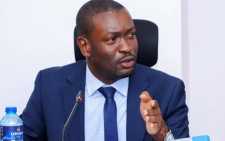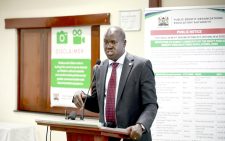Global forum charts forests’ restoration for SDGs target

As the world’s forests continue to come under threat from the climate crisis and human-induced deforestation, experts say the next decade will be crucial to save them before it is too late.
Ahead of this year’s United Nations Convention on Climate Change (COP30), in November, collective global efforts are needed this year to step up restoration finance and put forests at the centre of climate action.
Trees and forests are at the heart of many of the most important issues of the 21st century, ranging from the survival of long-lived trees to the livelihoods of people who depend on the sustained use of forest resources – the forest people.
The present and future state of forests is intimately tied to human factors: people strongly influence most of the world’s forests today, and these forests provide for the needs of people around the globe.
Forests cover 31 percent of the world’s land surface and are crucial for planetary well-being. They help mitigate climate change and are home to most of the world’s terrestrial biodiversity. They improve soil, air and water quality, services humanity is at risk to losing due to deforestation, forest degradation, and other threats.
Forests for life
More than 1.6 billion people worldwide depend directly on forests for food, shelter, energy, medicine and income. Against this backdrop, the 20th United Nations Forum on Forests (UNFF20) met last week to hold discussions on the implementation of the UN Strategic Plan for Forests 2017-2030.
The forest forum strategic plan highlights synergies with other global efforts on forests, land degradation, biodiversity, climate change and sustainable development. Under its two year-thematic cycles, UNFF20 had a technical focus, while UNFF21 in 2026 will be dedicated to policy dialogue, development, and decision-making.
This year’s forum discussed the interlinkages between the Global Forest Goals (GFGs), the Sustainable Development Goals (SDGs), the Kunming-Montreal Global Biodiversity Framework (GBF), and other international forest-related developments.
Three priorities were discussed, including reversing the loss of forest cover worldwide through sustainable forest management (SFM), increasing significantly the area of protected forests worldwide and other areas of sustainably managed forests, as well as the proportion of forest products from sustainably managed forests.
The third priority discussed was promoting the governance frameworks to implement SFM through the UN Forest Instrument, and enhance the contribution of forests to the 2030 Agenda for Sustainable Development.
Panels of speakers informed the UNFF on valuing forest ecosystems in national policy and strategy, the significance of a global hub on data, information, and knowledge on forest financing opportunities and best practices; and dryland forests. The UNFF was established in 2000, following a five-year period of policy dialogue within the Intergovernmental Panel on Forests (IPF) and the Intergovernmental Forum on Forests (IFF).
In October 2000, the Economic and Social Council (ECOSOC), in its resolution 2000/35 established the International Arrangement on Forests (IAF), including the UNFF as a subsidiary body of ECOSOC, with the main objective of promoting the management, conservation, and sustainable development of all types of forests.
The UN Forest Forum’s principal functions are to facilitate the implementation of forest-related agreements and foster a common understanding of SFM. It is also mandated to provide for continued policy development and dialogue among governments, international organisations and major groups.
UNFF also performs the role of addressing forest issues and emerging areas of concern in a holistic, comprehensive, and integrated manner. It is expected to enhance policy and programme coordination on forest-related issues, foster international cooperation and monitor, assess and report on progress. The global forest forum is also tasked with strengthening political commitment to the management, conservation, and sustainable development of all types of forests.
Last week’s discussions stressed the importance of the role of forests and SFM for achieving the SDGs and addressing climate change, biodiversity and land degradation. The meeting also discussed the importance of investing in healthy forests, the need to improve access to data, knowledge and good practices.
ECOSOC President Bob Rae said well-managed forests offer nature-based solutions to pressing global challenges and provide crucial livelihoods for people all over the world.
Noting that only five years remain to meet the SDGs, UN General President, Cameroonian Philémon Yang called for urgent action to ensure sustainably managed forests remain “the cornerstone of a healthier planet for all”.
UN Assistant Secretary-General for Policy Coordination Bjørg Sandkjær called for strengthened global cooperation and multilateralism and stressed the fundamental role of forests in planetary vitality.
Several countries reaffirmed their commitment to achieving the Global Forest Goals (GFGs). Poland, on behalf of the European Union (EU), said the UN Strategic Plan for Forests 2017-2030 provides a key framework for promoting sustainable forest management and enhancing collaboration.
Morocco, on behalf of the African Group, called for national and regional forest initiatives tailored to local realities. Congo stated that their new Forest Code has strengthened collaboration on the national level.
COP30 host Brazil highlighted strategic cross-regional initiatives that aim to conserve tropical forests, including the Tropical Forests Forever Facility and the 2023 United for Our Forests Joint Communiqué.
Meanwhile, the Center for International Forestry Research and World Agroforestry (CIFOR-ICRAF) continues with extensive work on trees and forest genetic resources, and biodiversity.
Farmers and forest dwellers’ ability to produce food and other goods and services depends on biodiversity in genes, species and specimens. Yet the world is experiencing an alarming and accelerating loss of biodiversity, including forests, undermining progress towards development goals related to poverty, health and climate.
CIFOR-ICRAF’s work on tree productivity and diversity, and on reforestation and afforestation aims to deliver on the best science needed to safeguard tree diversity, domesticate trees and deliver suitable tree planning material to growers – including for food, fodder, timber and medicinal plants.
As CIFOR-ICRAF CEO and Director-General Eliane Ubalijoro notes: “If forests are allowed to perform their natural functions undeterred, there is still time to bend the curve on climate change, biodiversity loss as well as land degradation and stop the run of heat records in the long term”.The State of the World’s Forests 2024 report reveals that despite a slowdown in deforestation in some regions, forests face increased pressures from climate-related stressors and rising product demands.
Innovations in forest conservation, restoration, and sustainable use are essential to mitigate these pressures, with a focus on technological, social, policy, institutional, and financial advancements.












